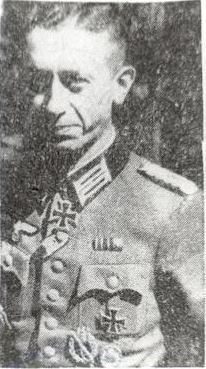Berger, Robert (Grenadier-Regiment 2)
- Date of birth:
- February 20th, 1914 (Batow/Brandenburg, Germany)
- Date of death:
- June 10th, 1982 (Waiblingen/Baden-Württemberg, Germany)
- Nationality:
- German
Biography
Promotions:
April 20th, 1936: Leutnant;
March 31st, 1939: Oberleutnant (RDA: April 1st, 1939 -76-);
February 15th, 1942: Hauptmann (RDA: March 1st, 1942 -61-);
September 1st, 1943: Major (RDA: -57-);
?: Oberstleutnant;
?: Oberst (Bundeswehr).
Career:
September 1st, 1939: Chef, 1. Kompanie, Grenadier-Regiment 2;
November 28th, 1941: Lazerett;
June 20th, 1942: Chef, 14. Kompanie, Grenadier-Regiment 2;
November 29th, 1942: Führer, Ski-Bataillon, 11. Jäger-Division;
January 17th, 1943: Führer, I. Bataillon, Grenadier-Regiment 2;
January 29th, 1943: Führerreserve OKH;
March 29th, 1943: Führer, I. Bataillon, Grenadier-Regiment 44;
June 27th, 1943: Führer, I. Bataillon, Grenadier-Regiment 2;
December 22nd, 1944: Grenadier-Regiment 1071;
October 15th, 1956: Bundeswehr;
1958: Kommandeur, Grenadier-Regiment 2;
1960: Taktiklehrer, Heeresoffizierschule II Hamburg;
1968: Lehrgruppe-Kommandeur, Heeresoffizierschule II Hamburg;
March 31st, 1973: Retirement.
Do you have more information about this person? Inform us!
- Period:
- Second World War (1939-1945)
- Awarded on:
- October 5th, 1939
- Period:
- Second World War (1939-1945)
- Awarded on:
- February 23rd, 1940
- Period:
- Second World War (1939-1945)
- Awarded on:
- November 25th, 1940
- Period:
- Second World War (1939-1945)
- Awarded on:
- October 16th, 1941
- Period:
- Second World War (1939-1945)
- Rank:
- Oberleutnant (1st Lieutenant)
- Unit:
- Chef, 1. Kompanie, Infanterie-Regiment 2, 11. Infanterie-Division
- Awarded on:
- March 7th, 1942
- Period:
- Second World War (1939-1945)
- Awarded on:
- 1942
- Period:
- Second World War (1939-1945)
- Awarded on:
- August 27th, 1943
- Period:
- Second World War (1939-1945)
- Rank:
- Major
- Unit:
- Kommandeur, I. Bataillon, Grenadier-Regiment 2, 11. Infanterie-Division
- Awarded on:
- March 7th, 1944
- Period:
- Second World War (1939-1945)
Sources
- Photo: TITLE
- - FELLGIEBEL, W.P., Elite of theThird Reich, Helion & Company Limited, Solihull, 2003.
- MAERZ, D, the german cross, B&B Publishing, Richmond, 2009.
- PATZWALL, K. & SCHERZER, V., Das Deutsche Kreuz 1941-1945, Band II, Verlag Klaus D. Patzwall, Norderstedt, 2001.
- THOMAS, FRANZ & WEGMANN, GüNTER, Die Ritterkreuzträger der Deutschen Wehrmacht 1939-1945, Biblio-Verlag, Osnabrück, 1987.











